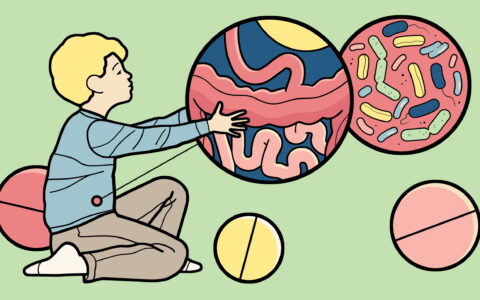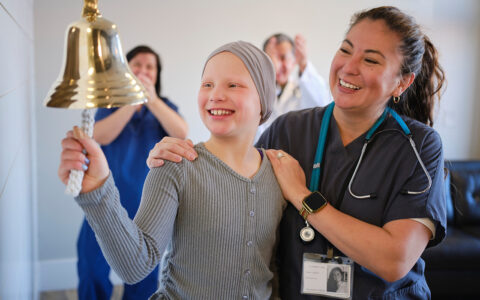Multiple medications that tackle obesity on a hormonal level have come onto the market in the past decade and have proven effective in studies in adults. As in much of pediatric medicine, where research is rife with recruiting challenges, availability of these drugs for young patients has lagged behind.
“There has been limited safety, efficacy, and follow-up data in youth with obesity, but the negative consequences of inaction may outweigh what look to be mild medication risks for these youth,” said Gitanjali Srivastava, M.D., medical director of clinical obesity medicine at Vanderbilt University Medical Center.
Determined to address obesity close to its root, she leads national task forces and panels to consolidate existing study outcomes and advocate at the federal level for early intervention and coverage of these treatments in children and adolescents. She also works on establishing guidelines and a clinical roadmap for clinicians. To date, this work has led to new pharmacotherapy guidelines for adolescents, published in 2019.
As a physician at Vanderbilt, she is finding success by prescribing medications along with lifestyle modifications, as well as metabolic and bariatric surgery (MBS) in an increasing number of adolescents. The unaddressed need in children under 12, however, drives much of her current advocacy work.
“We have six-year-olds developing prediabetes and high blood pressure,” Srivastava said. “Even before kids approach adolescent years, some are already developing joint aches and pains and sleep apnea. Waiting for them to be more debilitated and develop more complications before we offer them treatment is counterproductive and, frankly, cruel.”
Correcting Simplistic Assumptions
Over one out of five youths today have obesity and over 6 percent have severe obesity.
The traditional “calories in, calories out” formula has been debunked as a comprehensive explanation of obesity. Besides eating and exercise patterns, patients with obesity may be influenced by genetics, fetal programming and epigenetics, developmental aberrations, environmental, behavioral and psychosocial factors, medications unrelated to obesity, illness, cultural and family norms, and even poor sleep patterns.
Few children with obesity reverse course in adulthood, Srivastava explains, and delaying potential treatment until adulthood can doom children to progressive disability and premature death.
Help for a Dysfunctional Metabolism
Srivastava says because older generation anti-obesity medications were taken off the market in the 1990s, some clinicians are reluctant to prescribe medications for obesity. At that time, these drugs were not subject to stringent FDA criteria.
Today, there are six FDA-approved medications for obesity in adults: orlistat, phentermine, phentermine/topiramate extended release, naltrexone/ bupropion sustained release, liraglutide 3 milligrams, and semaglutide 2.4 milligrams. These are given as weekly injectables or in oral form.
Instead of revving up the sympathetic nervous system to speed up metabolism, these medications largely work on the appetite regulatory centers in the hypothalamus. They affect the strong interplay between gut hormones, physiology and brain signaling along many intricate pathways.
These medications lower the weight set point so that the body thinks that it should be at a lower weight than previously. The brain comes to recognize that lower set point and automatically puts the body into a fat-burning mode, making it a more effective calorie-burner. It also increases satiety.
“We now have sound scientific underpinnings of energy metabolism to change the narrative of ‘personal responsibility’ for the disease, and sufficient robust trials to support the use of these medications in children,” Srivastava said.
Expanded Treatment for Young Patients
While these medications address about 70 percent of the problem, Srivastava says a healthy lifestyle and family-based therapy for children are other pieces of the puzzle that encourage long-term success. In cases where this approach fails or the need for rapid weight loss is critical, she may recommend surgery for adolescents. Studies show good outcomes from surgical and non-surgical MBS strategies.
“If they undergo MBS during their adolescent years, they do phenomenally, and we can actually avert progression to severe obesity in adulthood. We’ve seen a remission in diabetes in many of these kids.”
Still, Srivastava argues that even earlier is better. Vanderbilt lobbied to be a site for one of the clinical trials for setmelanotide under Ashley Shoemaker, M.D., a leading pediatric endocrinologist for genetic obesity trials, which is now approved in patients six years of age and older with genetic obesity due to Bardet-Biedl syndrome. Other medications are also pending approval for that under-12 age group.
“This is the first time that we’ve had new treatments available for younger children with severe obesity,” Srivastava said.
On the insurance front, the challenges continue. However, TennCare, Tennessee’s Medicaid program, is now covering one of the medications, liraglutide 3 milligrams, that is FDA-approved in 12- to 17-year-olds.
“We hope and expect rapid expansion of medications covered and inclusion of younger patients,” Srivastava said. “Obesity is a cause or major contributor to the majority of adult diseases, not to mention the psychosocial disabilities. It’s time we addressed this problem at the root.”






